Rita Lam takes home top prize at the 2023 3MT Competition
April 20, 2023
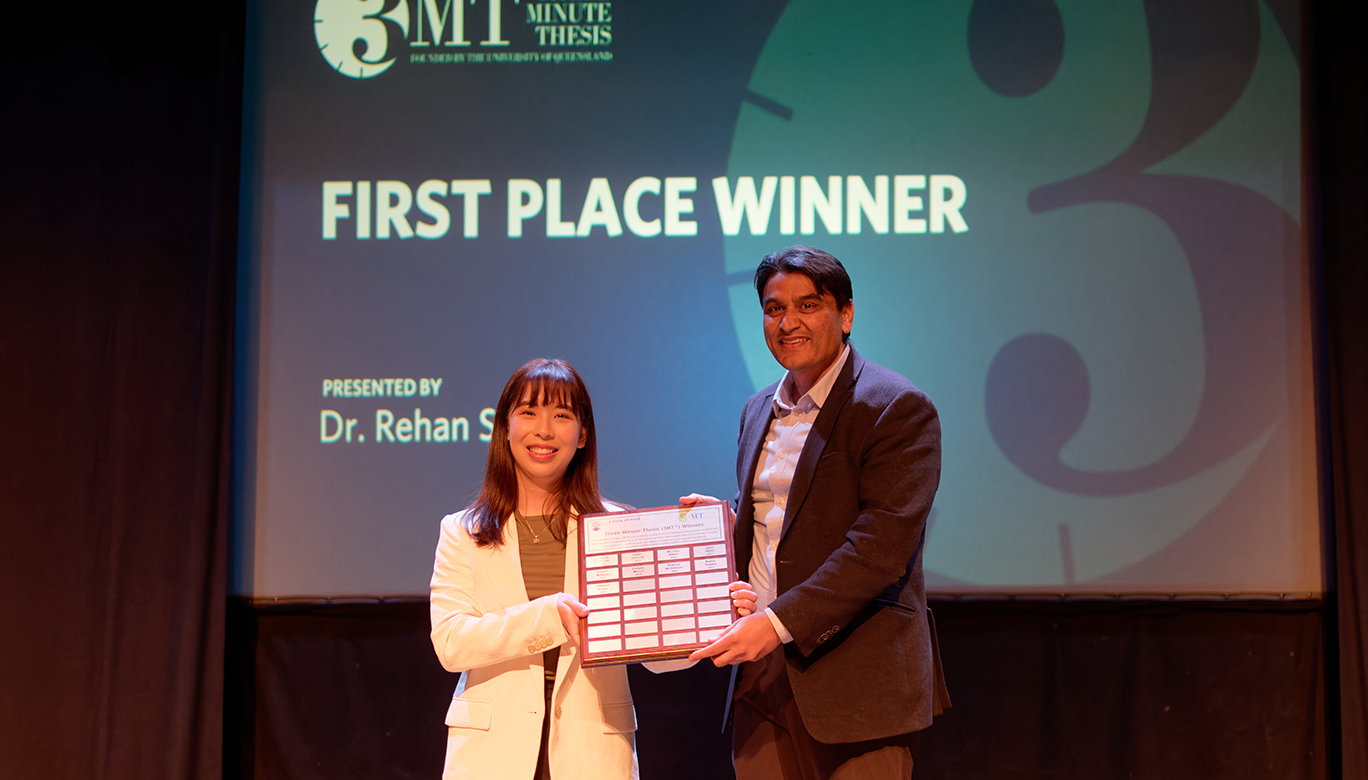
Rita Lam receiving her plaque for winning first place from judge Dr. Rehan Sadiq, UBC Okanagan Provost and Vice-President Academic.
Rita Lam’s research presentation on healthy building design and infectious disease control in built environments hit home with the audience at this year’s Three Minute Thesis final on April 6, 2023. A timely topic combined with impeccable delivery and audience engagement helped her secure the top spot at this year’s competition.
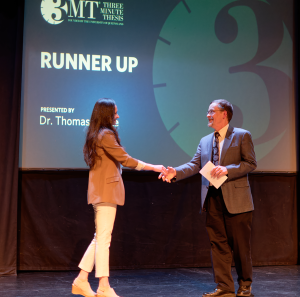
Nasim Hajati shaking hands with judge Thomas Heilke.
Lam, a Master’s of Applied Science student in Mechanical Engineering, shared her research into the effect of indoor daylight on the microbiome within a building through a newly developed electrochromic smart window. As the winner of the competition, Lam took home the top prize of $3,000 and will represent UBC Okanagan at the Western Regional Three Minute Thesis Competition at the University of Saskatchewan on May 25, 2023.
Nasim Hajati, a Master’s of Applied Science student in Electrical Engineering, was awarded second place and $2,000 for her presentation focused on her research involving an automated lower-body negative pressure chamber to control blood pressure in the heart of rats. This chamber allows scientists to test new medications on rats for heart performance factors in a non-invasive manner.
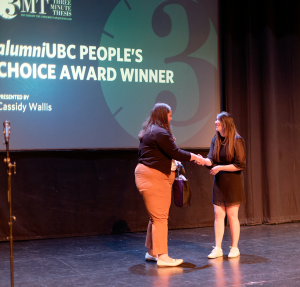
Alanna Shwed receiving her prize for the alumniUBC People’s Choice Award from judge Cassidy Wallis.
While Lam and Hajati captivated the minds of the judges, Alanna Shwed captured the hearts of the audience with her presentation, ‘Is the research system broken?’. She was awarded the alumniUBC People’s Choice Award as voted by the audience for her passionate presentation on how institutions can increase the quality of partnerships to produce research with community impact.
Dr. Sakiro Adebayo from the department of English and Cultural Studies kicked off the event with his presentation titled Frictions of Memory, which examined how fiction deals with or, in some cases, becomes the source of memory friction in post-conflict societies and the ways in which fictions of memory recalibrate discourses of futurity, solidarity, responsibility, justice, survival, and reconciliation.
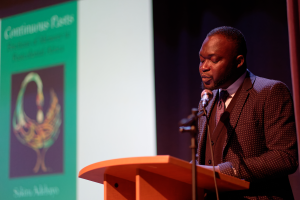
Featured speaker Dr. Sakiru Adebayo.
Overall, eleven graduate students took the stage to share their researcher at the first in-person competition since 2020. The presentations tackled some of the most complex issues facing our society. The judges agreed that scoring the presentations and choosing a winner was a difficult task.
Learn more about all of the finalists below.
2023 FINALISTS
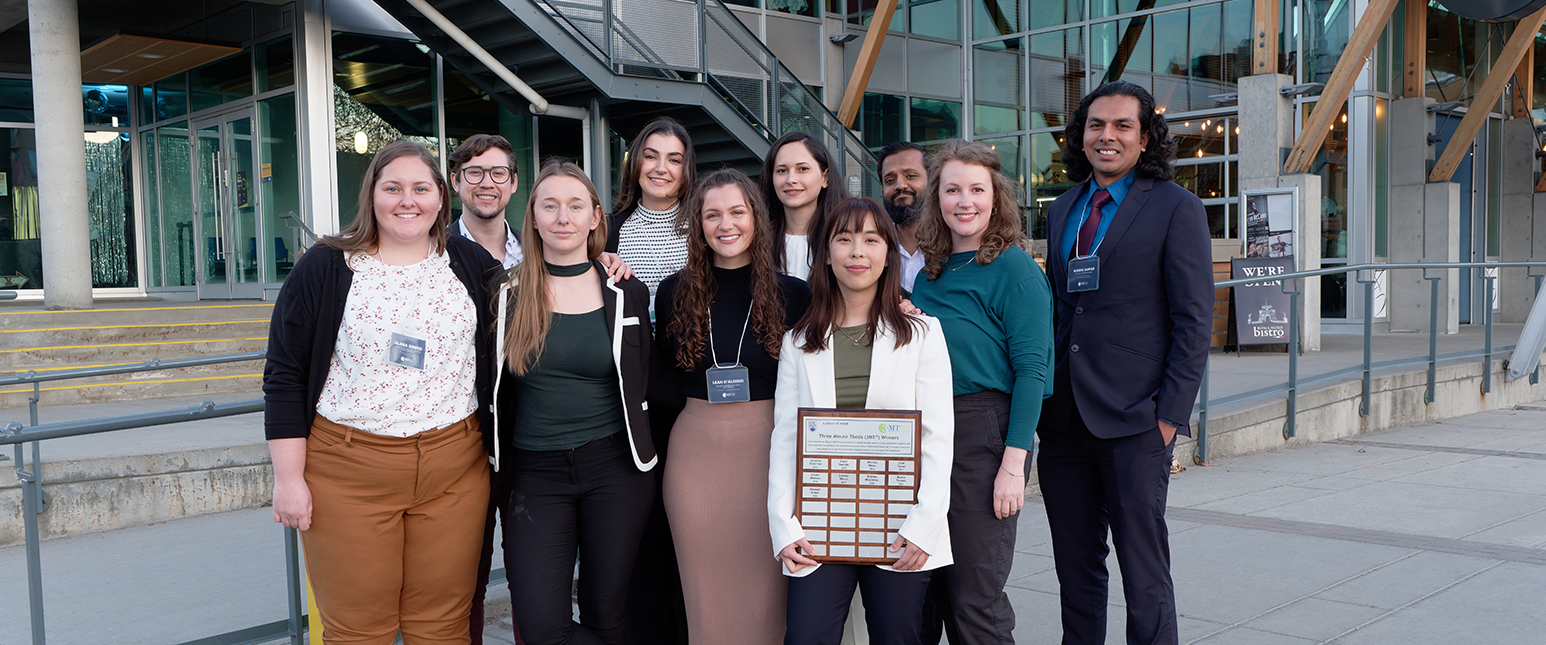
The 2023 finalists outside the Mary Irwin Theatre.
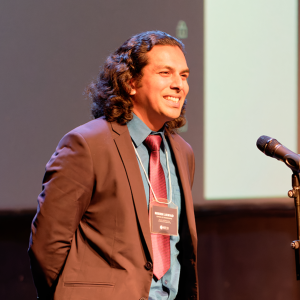 |
Nibirh Jawad
program: PhD in Electrical Engineering
supervisor: Dr. Loïc Markley
Wi-Fi Blocking Wallpaper
Nibirh’s research is in the field of applied electromagnetics. His research involves engineering materials that cause electromagnetic waves to reflect off or transmit through them differently than in naturally obtained materials.
|
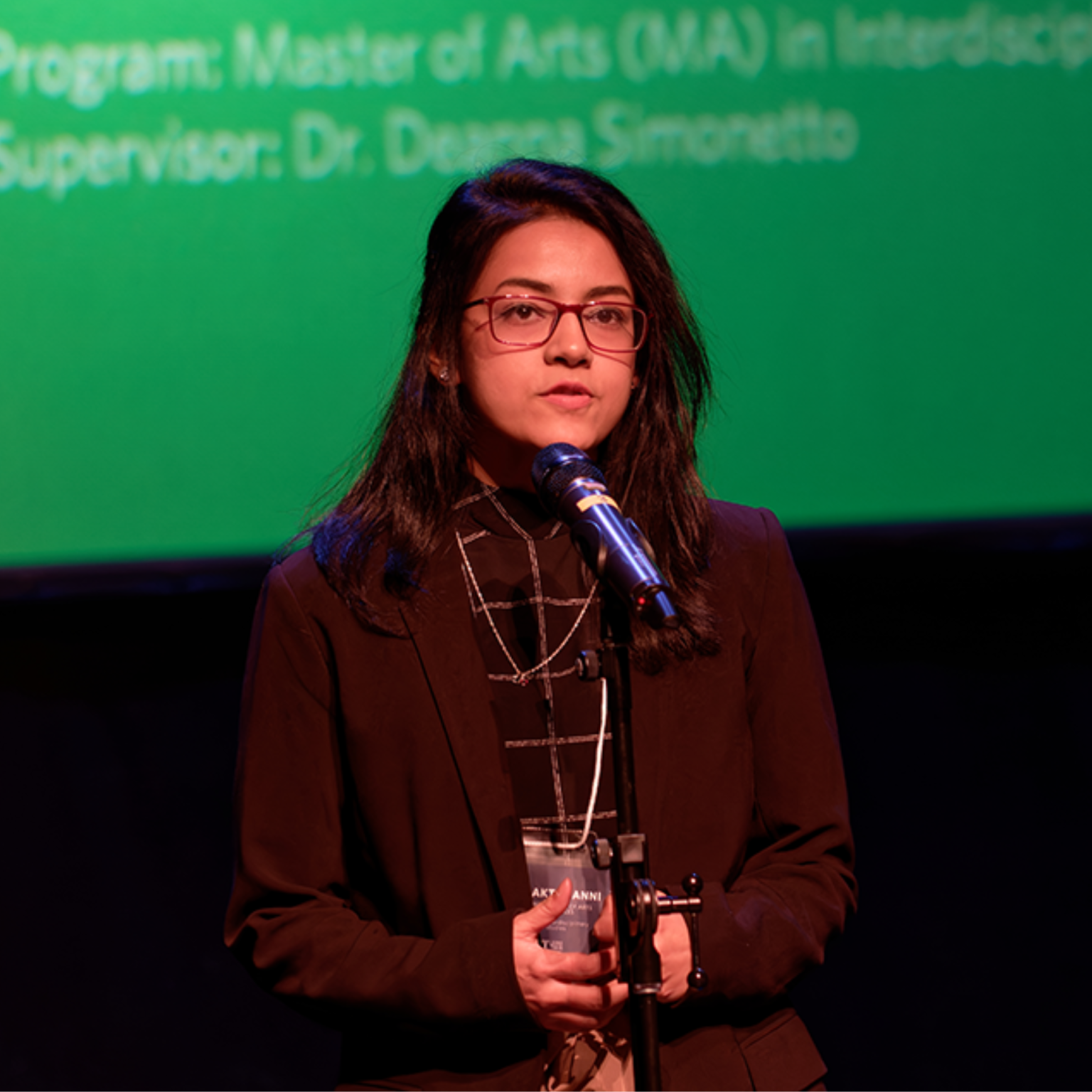 |
Zerrin Akter Anni
program: mA in interdisciplinary graduate studies
supervisor: Dr. Deana Simonetto
The portrayal of Violence Against Women in Bangladesh News Media: Seeing it through Rumana Manzur’s case
Seeing through the case of Rumana Manzur, Zerrin’s qualitative research uncovers the complex relationship between media and violence against women in the context of Bangladesh. The objective of her research is to find out how the popular news media of Bangladesh responds to the issue of violence against women and represents the victims of such violence in a certain way. |
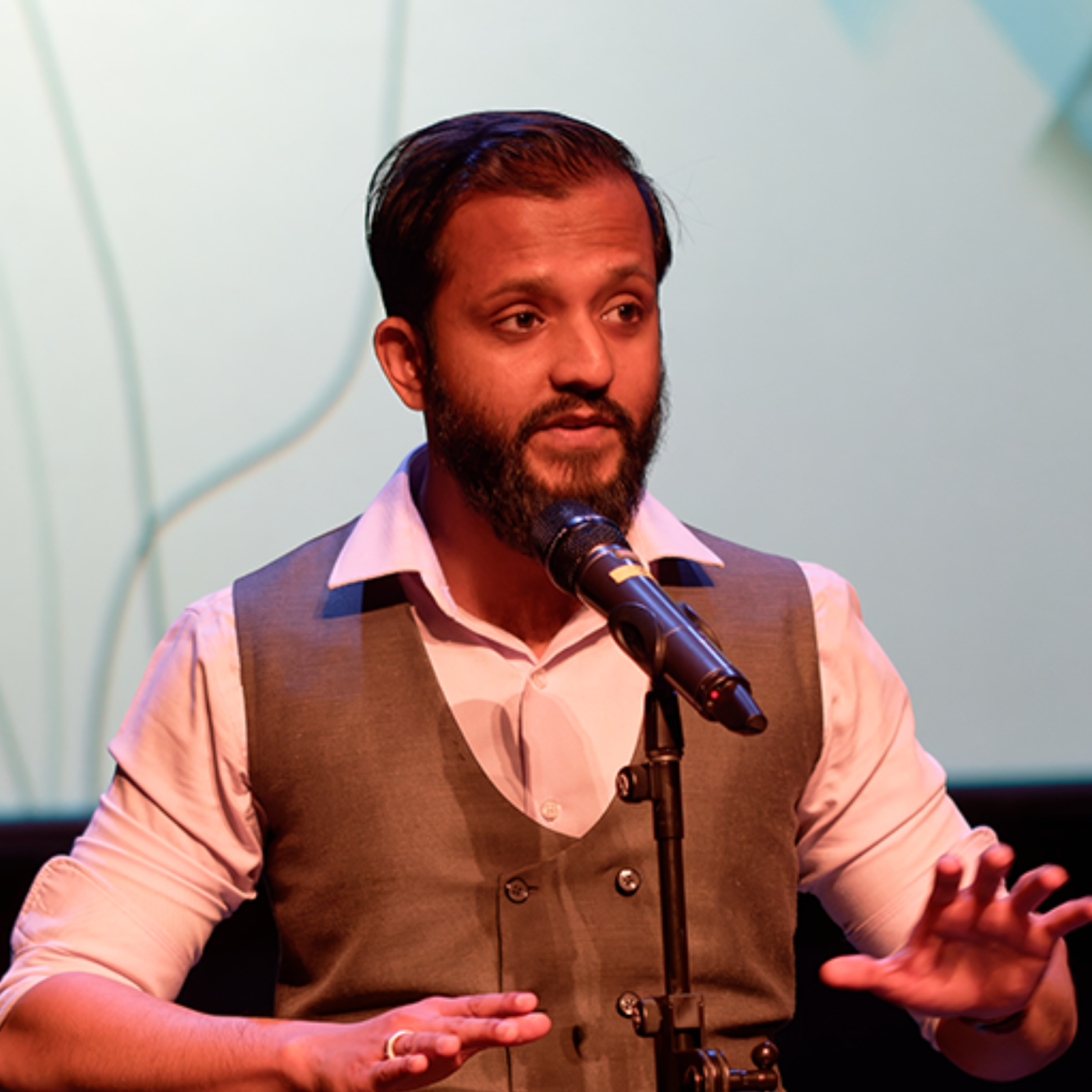 |
Shariff Faleel
program: PhD in computer science
supervisor: Dr. Pourang Irani
Hand as a Phone
Shariff’s research focuses on improving the interactions in Mixed Reality systems. Through his research, he aspires to create mobile computing platforms that would improve and augment human experiences. |
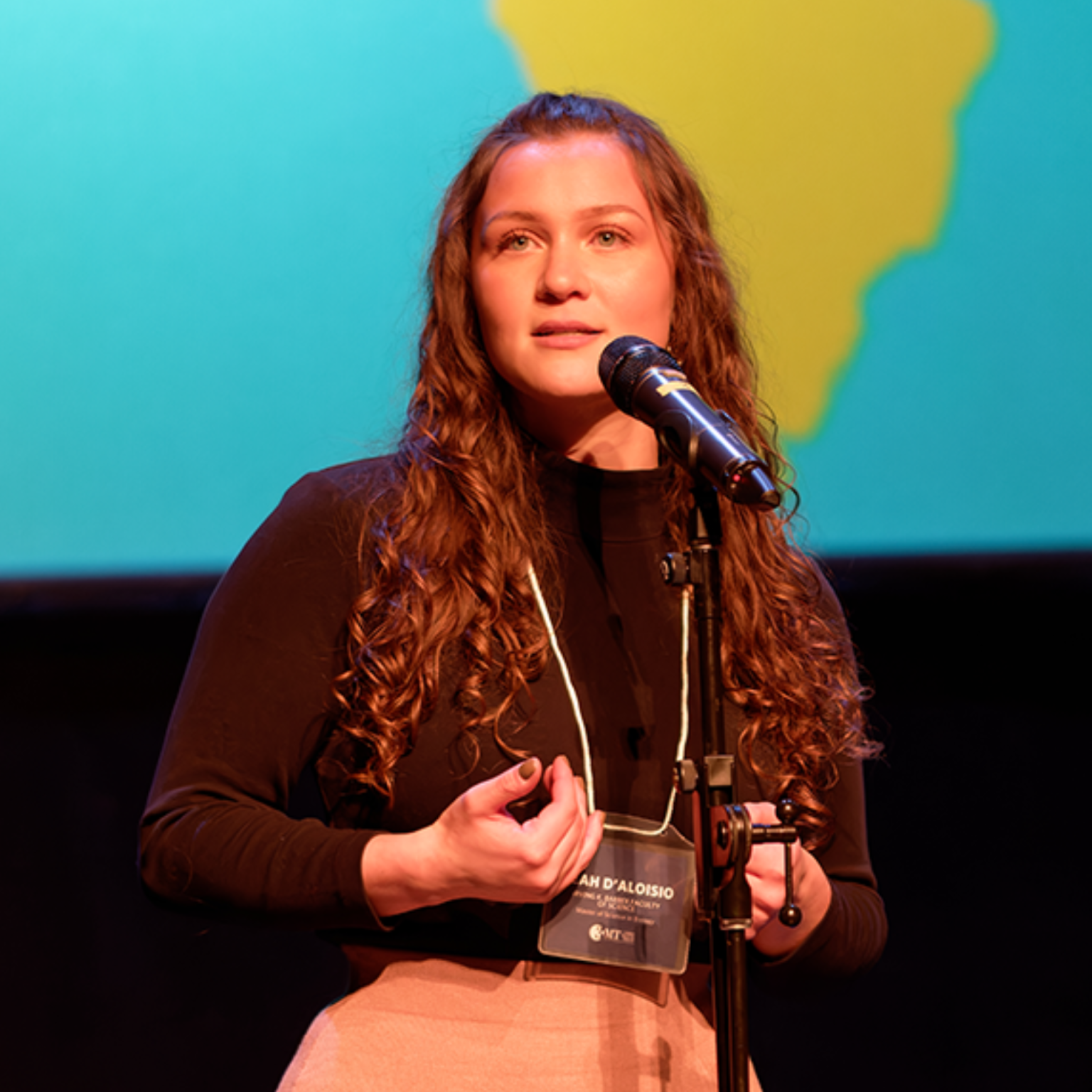 |
Leah D’Aloisio
program: msC in BIOLOGY
supervisor: Dr. Deanna Gibson
I Need Your Poop
Leah’s research aims to understand how immigration to Canada influences the human gut microbiome. Specifically, she’s focused on Indian populations living in Canada because their demographic is more at risk for developing inflammatory bowel disease (IBD) once living in a westernized country. Since the gut microbiome is heavily involved with IBD, her main objective is to characterize the gut microbiome in Indians, Indian immigrants and Indo-Canadians in the hopes of identifying clues to understand the underlying mechanisms involved with their elevated disease risk. |
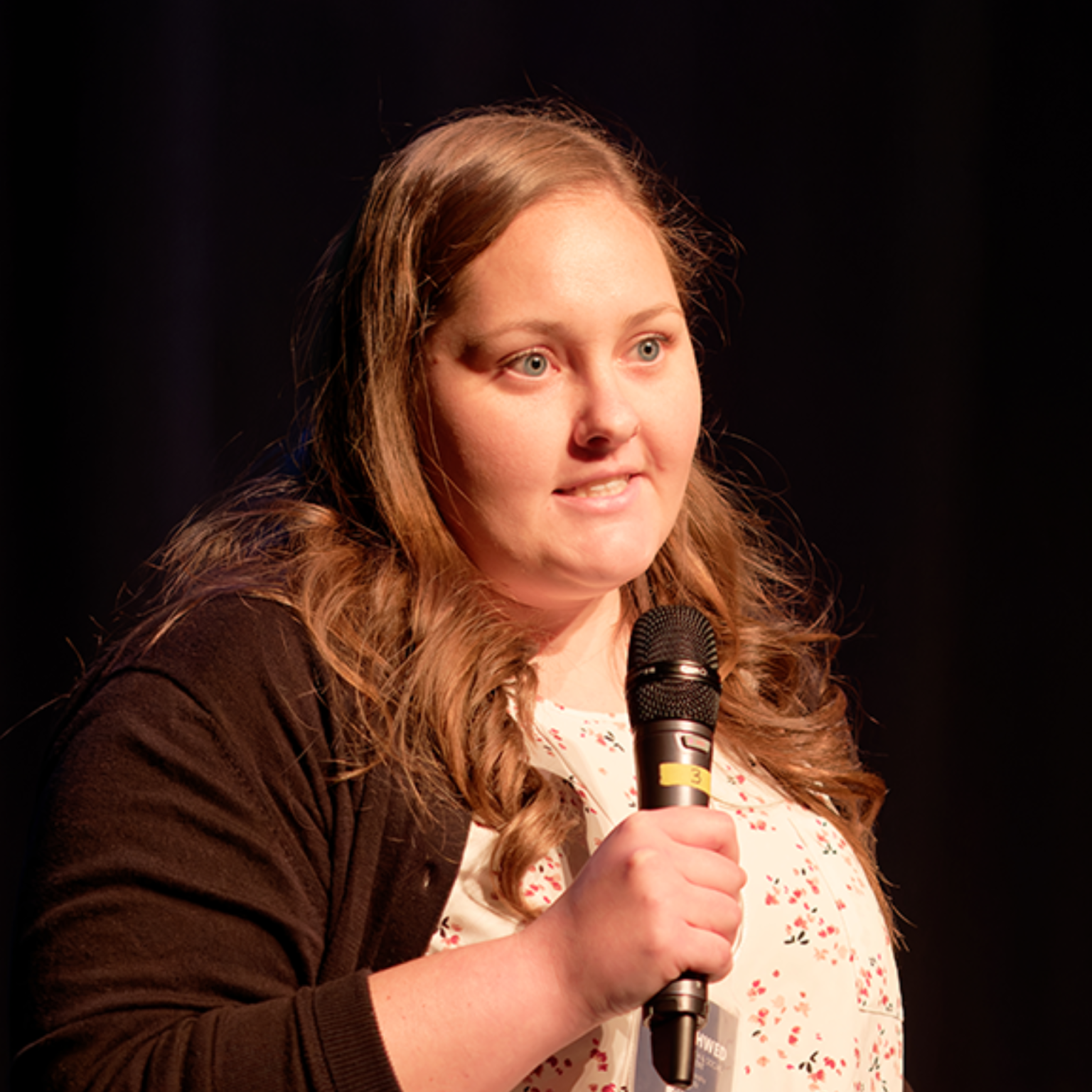 |
Alanna Shwed
program: PhD in kinesiology
supervisor: Dr. heather gainforth
Is the research system broken?
Alanna’s research involves working alongside a spinal cord injury research organization to support an increase in the quantity and quality of research partnerships. |
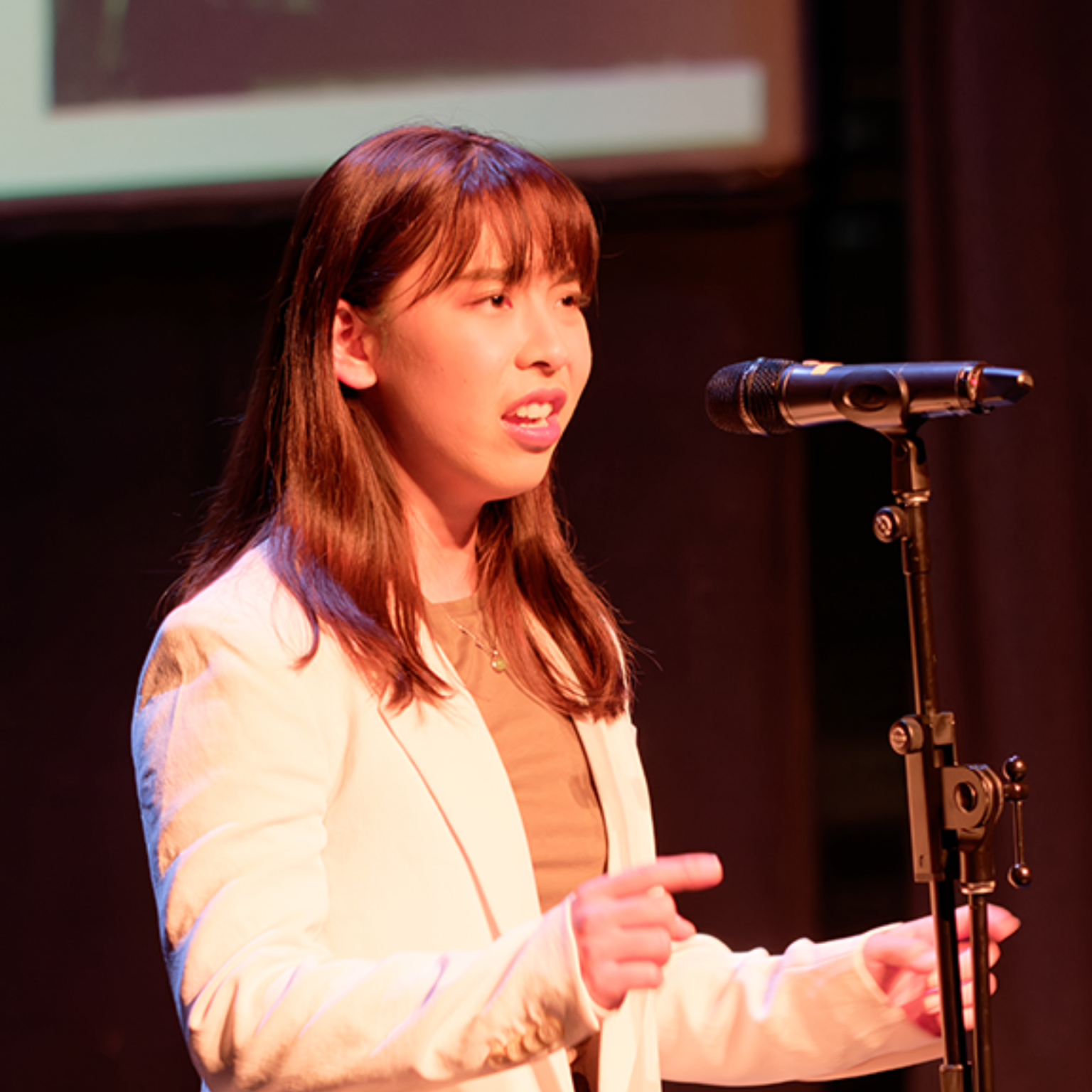 |
Rita Lam
program: MASC IN MECHANICAL ENGINEERING
supervisor: Dr. Sepideh Pakpour
Shining light to a healthy building: indoor daylight and indoor microbiome
Rita’s research aims to understand the interactions between two healthy building foundations: indoor daylight and indoor microbiome. Specifically, she studies the effect of indoor daylight through a newly developed electrochromic smart window on the microbiome within the building. The results of her study can provide important insights for future healthy building design and infectious disease control in all built environments. |
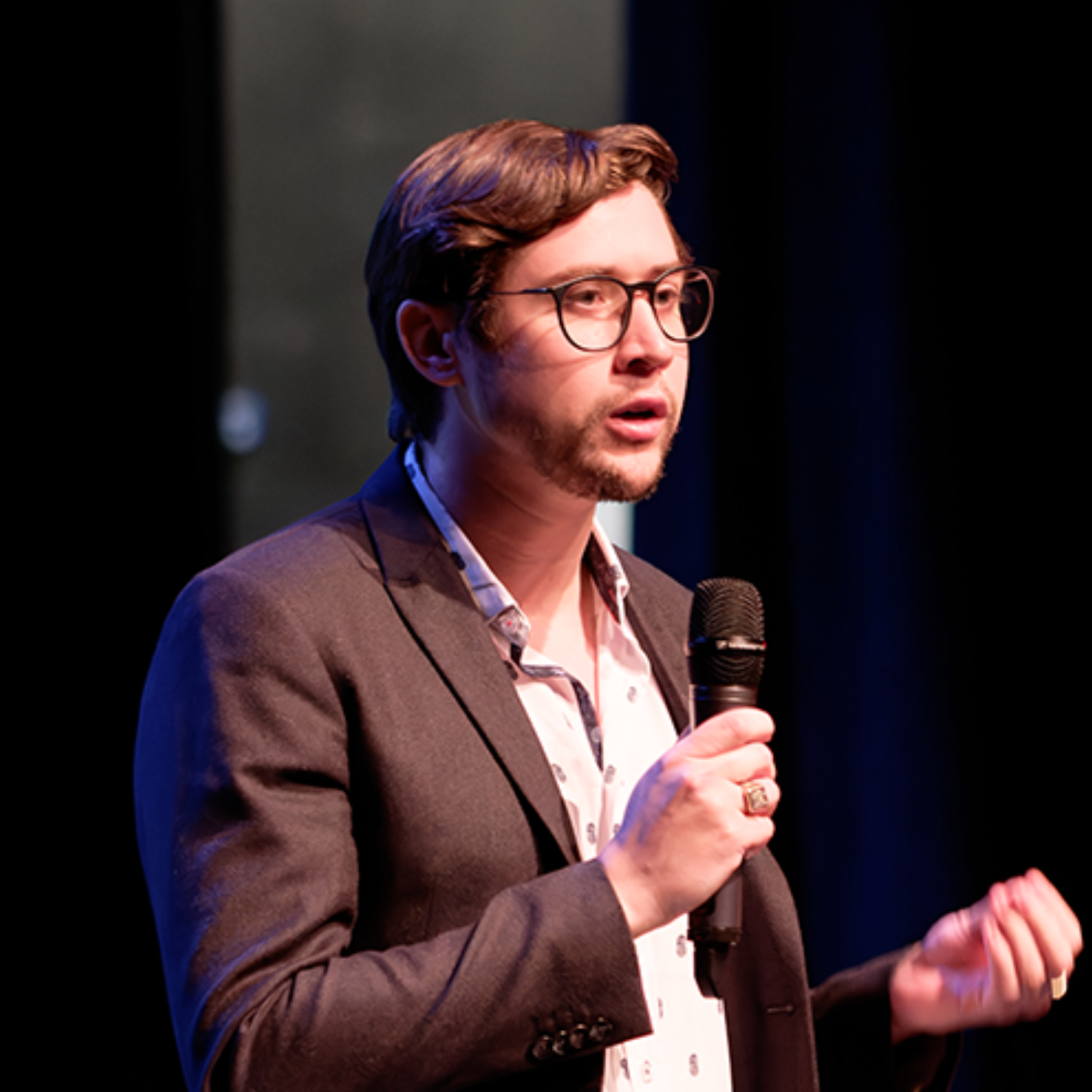 |
Quinn Malone
program: PhD in kinesiology
supervisor: Dr. Chris McNeil & Dr. Brian Dalton
High-and-mighty or dazed-and-confused? How acute cannabis intoxication affects our motor function
Cannabis is an effective treatment for a variety of conditions, including chronic pain, epilepsy, Parkinson’s disease, and others. However, the functional consequences associated with acute cannabis intoxication are poorly characterized. This presents a major concern as health professionals may be hesitant to recommend, and individuals may be reluctant to use, cannabis if resulting functional deficits are unknown. Quinn’s research explores how acute cannabis use impacts functional motor behaviours and the underlying mechanisms to lay a foundation for further work in developing cannabis products and effective medicines. |
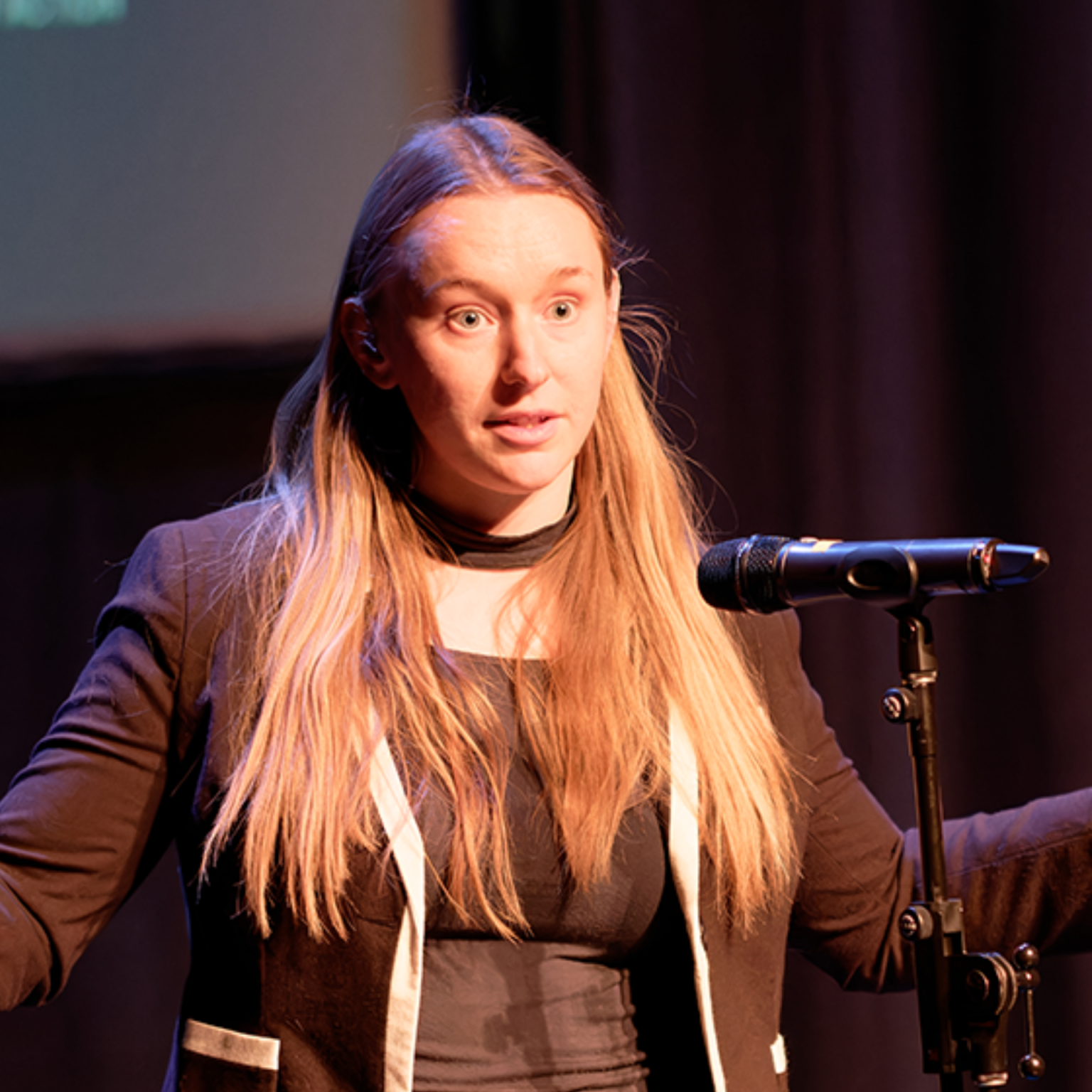 |
Kirstin Pulles
program: Ma in interdisciplinary graduate studies
supervisor: Dr. Jon Corbett & Dr. Mary Stockdale
The role of unions in climate activism
Many academics have theorized that unions will be key players in climate change advocacy. However, there are few case studies which explore how union and community partnerships can develop. Public transportation may be a climate issue that can build broad advocacy movements which include both transit unions and community members. Kirstin helped to launch a campaign for better transit in Kelowna which is co-led by Fridays for Future Kelowna and ATU Local 1722. She is a participatory activist researcher studying the campaign while also helping to lead it. |
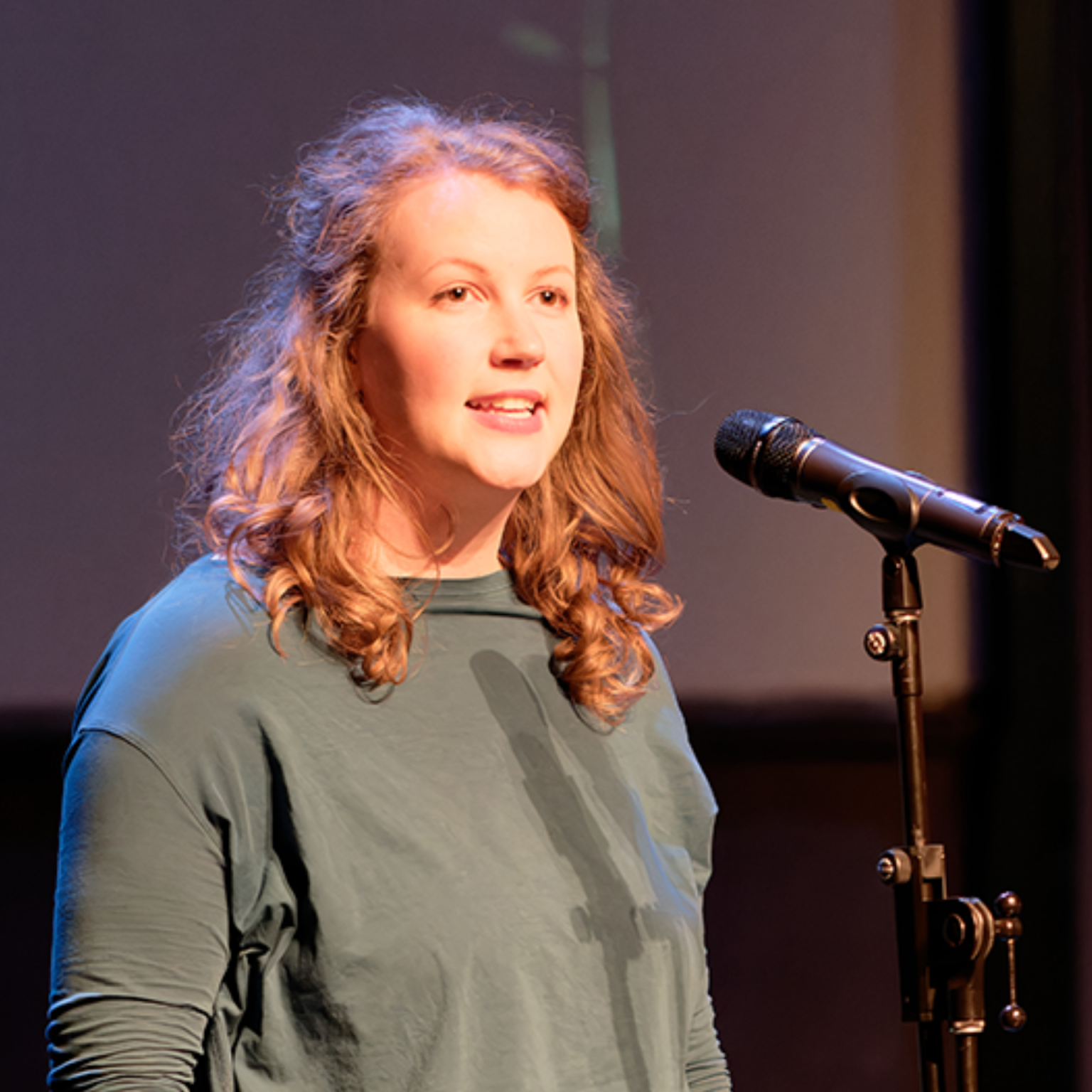 |
Miriam Cummings
program: MFA IN Interdisciplinary Studies, Performance & Creative Writing
supervisor: denise kenney
Building inner abundance through live participatory performance
Miriam Cummings is an interdisciplinary artist whose poetry, playwriting, and performance examine intimacy, loss, and motion through the world: how we move and what moves us. Miriam co-founded Hopegrown Productions and has developed four new plays, including her award-winning solo show: The One. Miriam began an MFA in Interdisciplinary Studies at UBCO in Fall 2022. Her thesis is a research-creation project that will take the form of a live, participatory performance. |
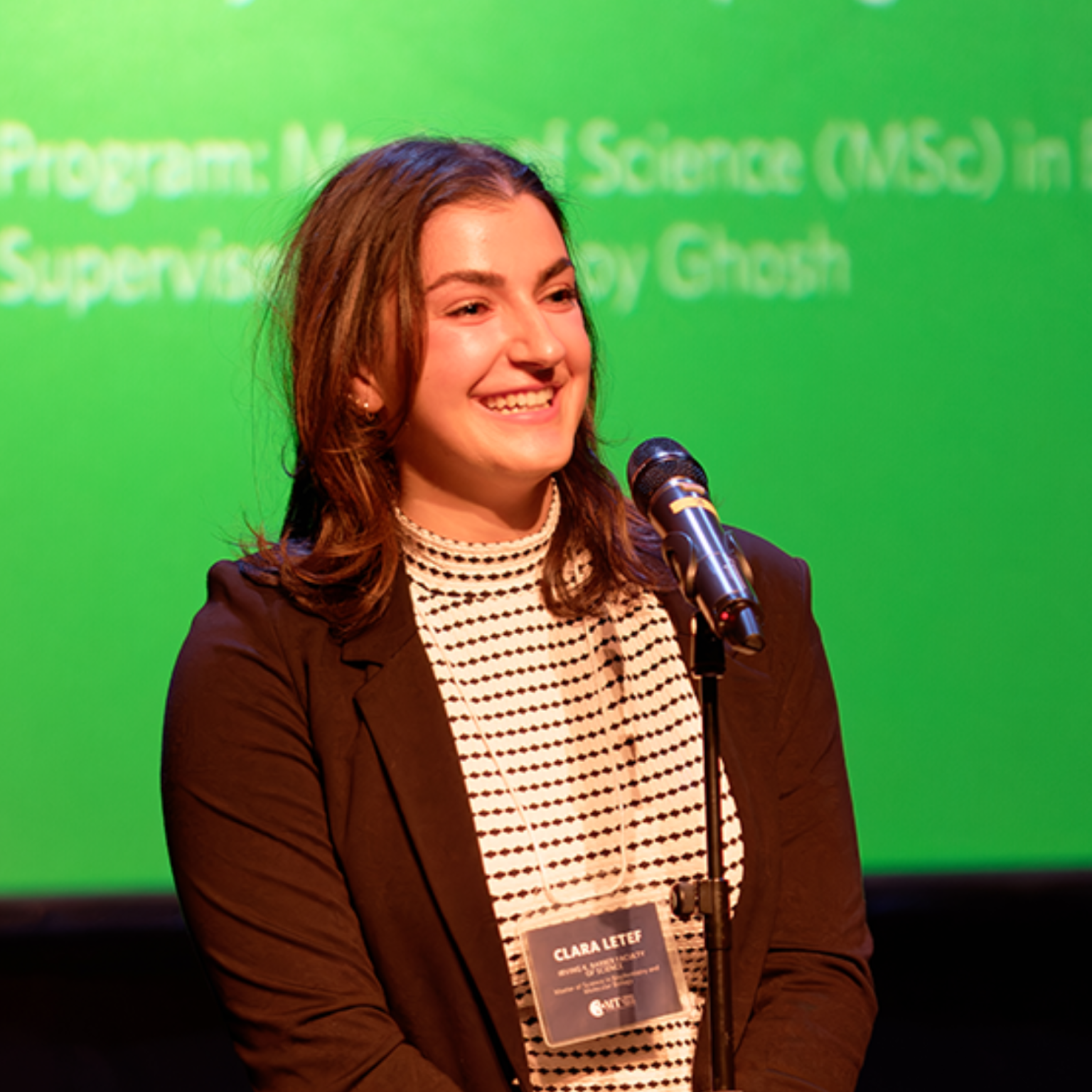 |
Clara Letef
program: MSC in Biochemistry and Molecular Biology
supervisor: Dr. Sanjoy Ghosh
Have you heard of vegetable oil?
The Western diet has become increasingly rich with vegetable oils, which primarily contain omega-6 fats. The surplus of these omega-6 fats in our diet (as compared to a balanced omega 3 fat to 6 ratio) may have negative impacts in terms of inflammation in the heart. Clara’s research focuses on how this high omega-6 diet impacts cellular and physiological functioning in the heart, and how we can avoid chronic inflammation which may lead to cardiovascular disease, cardiac fibrosis, and other negative health outcomes. |
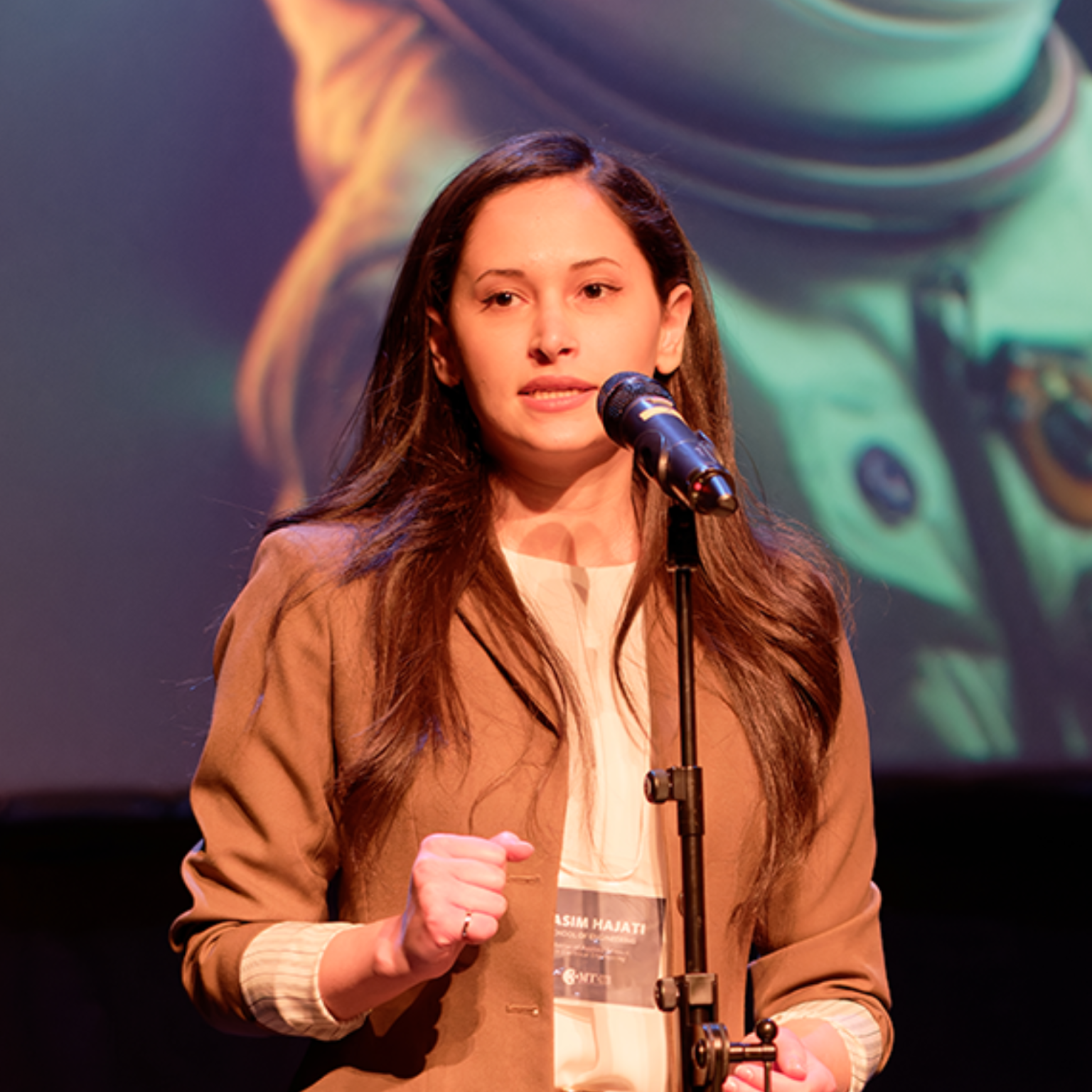 |
Nasim Hajati
program: Master of Applied Science in Electrical Engineering
supervisor: Dr. Rudolf Seethaler
Automated Negative Pressure Chamber to Test Heart Performance Factors on Rats
Nasim’s research involves building an automated lower-body negative pressure chamber to control blood pressure in the heart of rats. This chamber allows scientists to test new medications on rats for heart performance factors in a non-invasive manner. She is hoping that with this method, we could achieve higher test result accuracy with minimal damage to the rat. |
Posted in 3MT, College of Graduate Studies, Faculty of Creative and Critical Studies, Faculty of Health and Social Development, Irving K. Barber School of Arts and Sciences, Master Students, PhD Students, Psychology, Research, School of Education, School of Engineering, School of Health and Exercise Sciences















